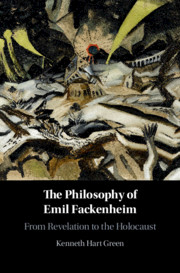Book contents
- The Philosophy of Emil Fackenheim
- The Philosophy of Emil Fackenheim
- Copyright page
- Dedication
- Epigraph
- Contents
- Acknowledgments
- Abbreviations
- Introduction The Unending Struggle with Revelation in the Thought of Emil Fackenheim
- 1 What Is Faith?
- 2 Individual versus Collective, Rational versus Mystical
- 3 Revelation as a Possibility
- 4 On Authority, Tradition, and History
- 5 Divine Power versus Human Freedom
- 6 From Presence to History
- 7 Confronting Radical Evil as Rupture
- 8 Diabolical Revelation and the Holocaust
- 9 Negative Absolute and Fragmentary Transcendence
- Conclusion Revelation of the Diabolical Truth in History
- Bibliography
- Index
5 - Divine Power versus Human Freedom
Published online by Cambridge University Press: 06 October 2020
- The Philosophy of Emil Fackenheim
- The Philosophy of Emil Fackenheim
- Copyright page
- Dedication
- Epigraph
- Contents
- Acknowledgments
- Abbreviations
- Introduction The Unending Struggle with Revelation in the Thought of Emil Fackenheim
- 1 What Is Faith?
- 2 Individual versus Collective, Rational versus Mystical
- 3 Revelation as a Possibility
- 4 On Authority, Tradition, and History
- 5 Divine Power versus Human Freedom
- 6 From Presence to History
- 7 Confronting Radical Evil as Rupture
- 8 Diabolical Revelation and the Holocaust
- 9 Negative Absolute and Fragmentary Transcendence
- Conclusion Revelation of the Diabolical Truth in History
- Bibliography
- Index
Summary
In his search for authentic revelation, Fackenheim asks why modern philosophy mounted a systematic critique of religion. He discovered that its animus against religion is not so much because of religion’s perceived antagonism to reason, but because it saw religion as inimical to human freedom. Freedom is the pride of modern man, and of modern philosophy. It is the essential modern political principle, the very basis of liberal democracy. The possibility of creating a new political order based on maximizing individual freedom and autonomy was originally conceived philosophically by Spinoza and Locke, and developed and promoted by other acute thinkers. Freedom enhances human worth and dignity, because it allows the individual to choose his own path and pursue it employing his own unaided powers. Freedom also urges bold scientific discovery, unimpeded by religious doctrine, which can lead to remarkable historical advances. Revelation seems to compromise man’s freedom to “create,” think freely, and decide for himself. Thus revealed religion is attacked by modern philosophy as an act of justice, believing that it makes man dependent on God, thereby enfeebling and diminishing his powers.
- Type
- Chapter
- Information
- The Philosophy of Emil FackenheimFrom Revelation to the Holocaust, pp. 156 - 199Publisher: Cambridge University PressPrint publication year: 2020



